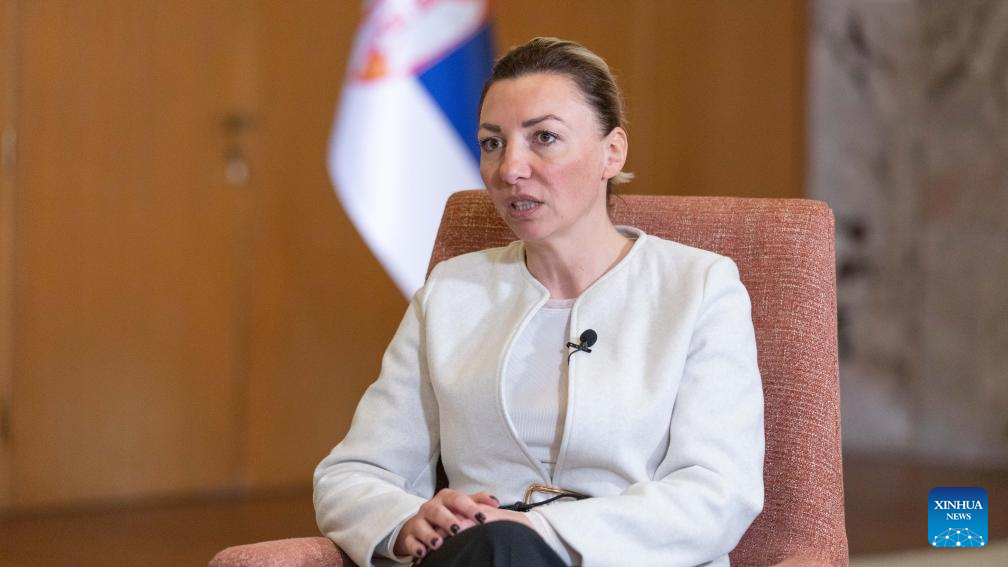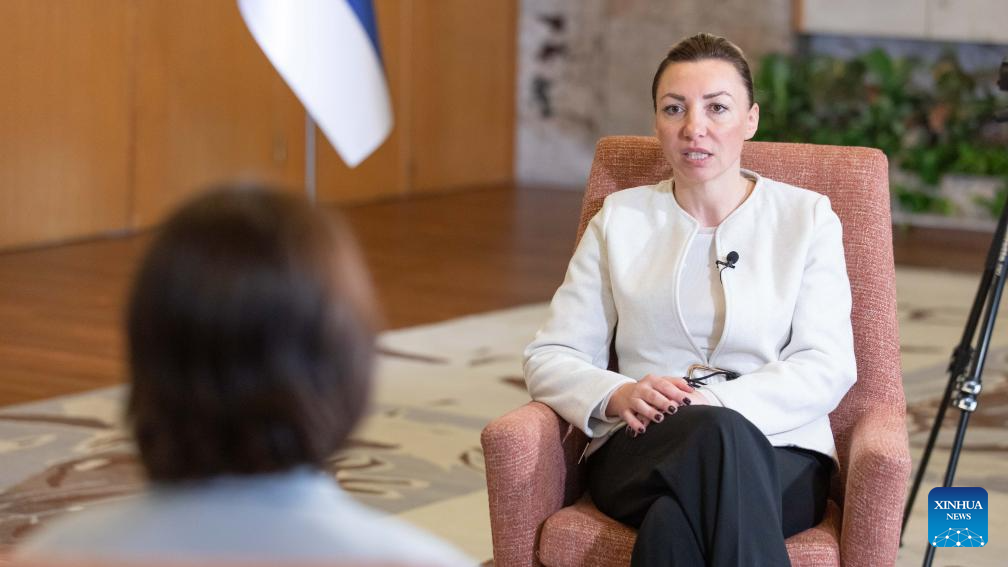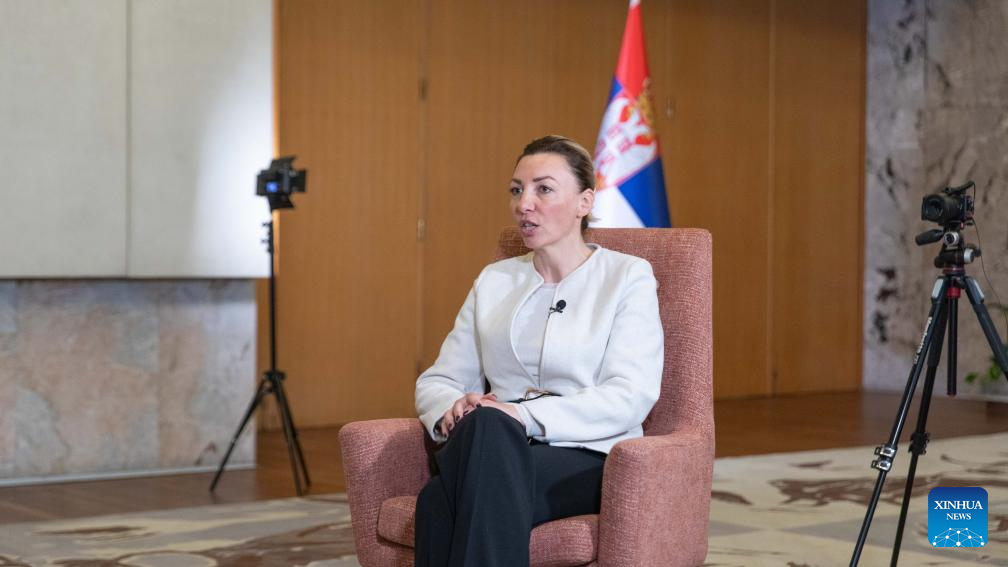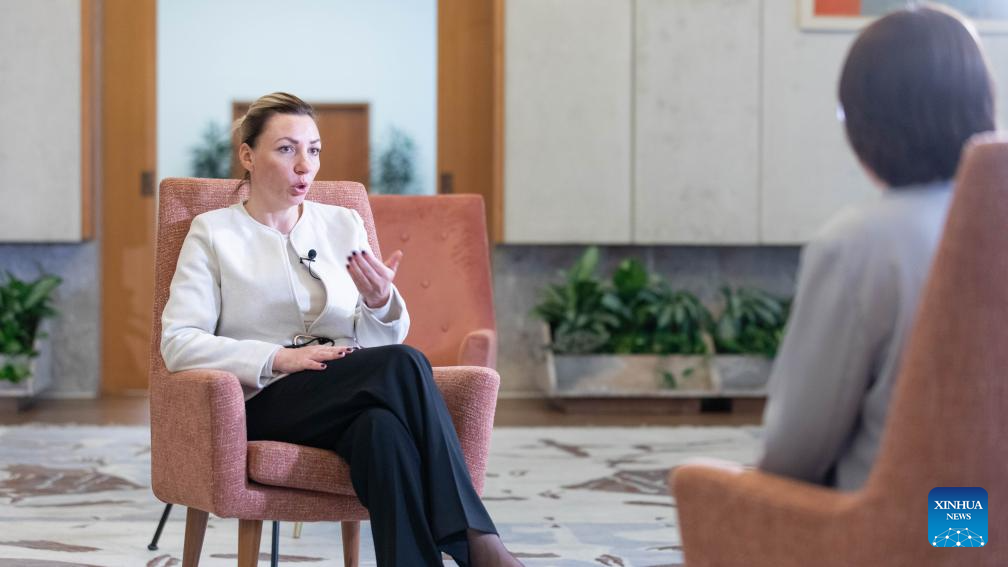Interview: Serbian minister has "high expectations" for global leaders' meeting in Beijing to advance women's empowerment
Source: Xinhua
Editor: huaxia
2025-10-10 17:07:30

Tatjana Macura, Serbia's minister without portfolio in charge of gender equality, the prevention of violence against women, and economic and political empowerment of women, speaks in an exclusive interview with Xinhua in Belgrade, Serbia, Oct. 2, 2025. (Photo by Wang Wei/Xinhua)
by Xinhua Writer Zhang Xuan
BELGRADE, Oct. 10 (Xinhua) -- "I have high expectations for the upcoming global leaders' meeting on women to be held in Beijing," said Tatjana Macura, Serbia's minister without portfolio in charge of gender equality, the prevention of violence against women, and economic and political empowerment of women.
Shortly before attending the meeting, Macura told Xinhua in an interview that her expectation "goes in the direction of protecting the rights of women that have been achieved so far," adding that it is necessary to recognize how the role of women in society has evolved through generations, to encourage men and women to cooperate, and to build consensus to further promote the "power of women" in the new era.
Macura added that she expects the summit to "focus on safeguarding the rights women have achieved so far."
"Beijing was in fact the starting basis for the adoption of the Beijing Declaration," she noted, adding that this year's event marks 30 years since its adoption.
Macura highlighted that the Beijing Declaration laid the foundation for global legislative efforts aimed at strengthening and protecting women's rights. "The very fact that, three decades later, work in this field continues shows how meaningful and enduring that commitment has been," she said. "China's decision to gather world leaders again in Beijing to revisit these goals sends a strong message about how seriously the Chinese government takes this issue."
"Every woman's struggle for rights has meaning, as each effort contributes to the progress we see today," Macura added. "I thank Beijing for once again hosting such an important event."
She further said that Serbia has made notable progress over the past 30 years, especially in women's economic and political empowerment. Today, women make up approximately 40 percent of members in the Serbian parliament and around 30 percent of the national government. Women also hold key leadership positions, including speaker of the National Assembly and heads of both the Supreme Court and the Constitutional Court.
"In sectors such as healthcare, administration, and even science -- women now represent 52 percent of the total number," she said.
Macura stressed that Serbia has implemented significant legislative measures to safeguard women's rights, focusing especially on preventing and combating violence against women and girls. In recent years, the country adopted the Law on the Prevention of Domestic Violence, and more recently, the Draft Law on the Exercise of Rights from the Alimony Fund, which guarantees state support to single-parent families -- predominantly led by women -- during times of need.
Looking ahead, Macura said the current global women's agenda should shift toward addressing the challenges in protecting women's rights and outlining the future course of development. "In the 21st century, both society and family life have changed significantly -- and so have women's roles," she said. "The protection of women's rights must evolve accordingly, while respecting cultural traditions and values."
She called for stronger partnerships between men and women, not only on global issues like economic and political empowerment, but also in everyday life. "I strongly support institutional dialogue and the peaceful resolution of conflicts and disputes," she said.
She added that Serbia supports the vision of humanity as "a deeply interconnected community with a shared future" and recognizes the importance of enhancing global governance to build a peaceful, secure and prosperous world.
Macura also noted that China's Global Governance Initiative provides an important opportunity to reaffirm that women are key actors in sustainable economic and social development, and that gender equality must be integrated into all global processes. ■

Tatjana Macura, Serbia's minister without portfolio in charge of gender equality, the prevention of violence against women, and economic and political empowerment of women, speaks in an exclusive interview with Xinhua in Belgrade, Serbia, Oct. 2, 2025. (Photo by Wang Wei/Xinhua)

Tatjana Macura, Serbia's minister without portfolio in charge of gender equality, the prevention of violence against women, and economic and political empowerment of women, speaks in an exclusive interview with Xinhua in Belgrade, Serbia, Oct. 2, 2025. (Photo by Wang Wei/Xinhua)

Tatjana Macura, Serbia's minister without portfolio in charge of gender equality, the prevention of violence against women, and economic and political empowerment of women, speaks in an exclusive interview with Xinhua in Belgrade, Serbia, Oct. 2, 2025. (Photo by Wang Wei/Xinhua)



